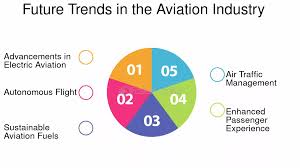Training Course on Global Aviation Industry Overview and Trends
Training Course on Global Aviation Industry Overview and Trends is designed to provide professionals with a deep understanding of aviation trends, market disruptions, regulatory frameworks, and technological innovations shaping the future of flight

Course Overview
Training Course on Global Aviation Industry Overview and Trends
Introduction
The global aviation industry is a cornerstone of international trade, economic growth, and cultural exchange. With the emergence of smart airports, sustainable aviation, and AI-driven airline operations, this dynamic sector continues to evolve rapidly. Training Course Global Aviation Industry Overview and Trends is designed to provide professionals with a deep understanding of aviation trends, market disruptions, regulatory frameworks, and technological innovations shaping the future of flight. Participants will explore both commercial aviation and air cargo trends, delve into post-pandemic recovery strategies, and analyze passenger experience transformation.
From emerging aviation markets to the adoption of green aviation technologies and digital air traffic management, this course empowers learners to grasp the full scope of global aviation. Professionals from aviation, travel, logistics, government, and investment sectors will gain real-world insights through case studies, interactive sessions, and strategic forecasts. Delivered by industry experts, this training is essential for anyone looking to stay competitive in the rapidly evolving aerospace and aviation sector.
Course Duration
5 days
Course Objectives
- Understand the current landscape of the global aviation industry
- Identify post-pandemic recovery trends and aviation resilience strategies
- Explore sustainable aviation fuel (SAF) and green technologies
- Analyze smart airports and the role of IoT in aviation
- Examine AI and automation in airline operations
- Evaluate airline alliances, mergers, and global market consolidation
- Study air cargo trends and e-commerce growth impacts
- Understand regulatory compliance and aviation safety standards
- Assess the impact of digital transformation on passenger experience
- Monitor emerging aviation markets and low-cost carrier growth
- Discover the evolution of urban air mobility (UAM) and eVTOLs
- Learn about cybersecurity challenges in aviation infrastructure
- Examine the future of air traffic management using satellite and AI technologies
Organizational Benefits
- Enhanced team awareness of aviation megatrends
- Better decision-making based on global aviation insights
- Strengthened compliance and risk mitigation strategies
- Increased innovation capacity for smart aviation projects
- Informed investment in sustainable aviation initiatives
Target Audience
- Airline executives and managers
- Airport operations professionals
- Aviation regulators and policymakers
- Travel and tourism professionals
- Aviation consultants and analysts
- Investors and financial institutions
- Aerospace manufacturers and engineers
- Supply chain and logistics managers
Course Outline
Module 1: Introduction to the Global Aviation Industry
- Historical evolution of commercial aviation
- Key global aviation markets
- Aviation’s role in global economy
- Stakeholders in the aviation ecosystem
- Case Study: IATA’s response to COVID-19
Module 2: Aviation Trends & Market Dynamics
- Airline consolidation & alliances
- Regional and global growth hotspots
- Low-cost carrier market expansion
- Air cargo and e-commerce boom
- Case Study: Rise of IndiGo & Wizz Air
Module 3: Technology & Innovation in Aviation
- AI and automation in flight operations
- Internet of Things (IoT) in smart airports
- Blockchain in airline logistics
- Digital twins and predictive maintenance
- Case Study: Heathrow Airport digital upgrade
Module 4: Sustainability & Environmental Impact
- Sustainable Aviation Fuel (SAF)
- Net-zero emissions goals
- Eco-friendly aircraft designs
- Environmental regulations & compliance
- Case Study: Airbus ZEROe hydrogen project
Module 5: Passenger Experience & Personalization
- Digital check-in and biometrics
- In-flight connectivity and entertainment
- AI-based customer service
- Loyalty programs and data analytics
- Case Study: Emirates passenger personalization
Module 6: Urban Air Mobility & Future Air Travel
- eVTOL aircraft development
- Urban air corridors and infrastructure
- Drone delivery systems
- Investment and regulatory frameworks
- Case Study: Joby Aviation's UAM rollout
Module 7: Aviation Risk, Safety & Security
- Cybersecurity in aviation networks
- Safety management systems (SMS)
- Incident and accident case studies
- Pandemic preparedness and response
- Case Study: Boeing MAX safety overhaul
Module 8: Future of Air Traffic Management
- Satellite-based navigation systems
- AI-driven airspace optimization
- Integration of drones into civil airspace
- Global harmonization of ATM systems
- Case Study: SESAR Joint Undertaking (EU)
Training Methodology
- Instructor-led live sessions
- Interactive case studies and simulations
- Group discussions and scenario analysis
- Industry guest lectures
- Digital resource toolkit and assessments
Register as a group from 3 participants for a Discount
Send us an email: info@datastatresearch.org or call +254724527104
Certification
Upon successful completion of this training, participants will be issued with a globally- recognized certificate.
Tailor-Made Course
We also offer tailor-made courses based on your needs.
Key Notes
a. The participant must be conversant with English.
b. Upon completion of training the participant will be issued with an Authorized Training Certificate
c. Course duration is flexible and the contents can be modified to fit any number of days.
d. The course fee includes facilitation training materials, 2 coffee breaks, buffet lunch and A Certificate upon successful completion of Training.
e. One-year post-training support Consultation and Coaching provided after the course.
f. Payment should be done at least a week before commence of the training, to DATASTAT CONSULTANCY LTD account, as indicated in the invoice so as to enable us prepare better for you.